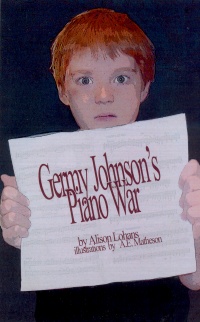| ________________
CM . . . . Volume XVIII Number 7 . . . . October 14, 2011
excerpt:
J.J. has to take piano lessons, and he is not happy about it! He thinks piano lessons are pointless, and after getting a black eye from his first lesson and being made fun of in class for it, he decides to declare a piano war. He hides his workbook, gets his little sister to practice the piano in his place, and he even brings a snake to one of his lessons to scare his teacher. But with each new lesson J.J. attends, he starts to realize that playing the piano can actually be kind of cool. As J.J. discovers that practice and a good attitude make playing music fun, he determines that a war on the piano might not be necessary after all. Germy Johnsonís Piano War marks the third appearance of the character of J.J. who has previously appeared in Alison Lohansís The Mystery of the Lunchbox Criminal and Germy Johnsonís Secret Plan. J.J. is a creative kid who likes to come up with grand ideas for solving his problems. This book is not really connected to Germy Johnsonís Secret Plan, although it might be beneficial to have read that book first as Germy Johnsonís Piano War does refer to the plot of Secret Plan a couple of times. Additionally, the name ďGermy JohnsonĒ seems to be reminiscent of Germy Johnsonís Secret Plan and is not actually relevant to the Piano War plot, which can be a little confusing for a reader unfamiliar with the previous work, even though Germy Johnsonís Piano War is, overall, a stand alone story. Lohansí writing follows J.J.ís train of thought, and while sometimes events can move quickly because of this, the thought processes and imagination of the title character are realistic and often quite comical. This story also does a good job of making day-to-day activities seem exciting and fun. J.J. likes to play video games, for instance, and when he plays these games, there is often a description of what happens on the screen, an approach which allows the reader to enjoy these mini-adventures alongside J.J. As well, some of the piano lessons, such as when J.J. gets a black eye from falling off his stool and hitting his face on the piano, seem really over the top and rather amusing. What may have made this story a little more interesting, however, would have been more explanation about what it is like to play the piano. There is actually very little to do with piano playing in this tale. Instead, most of the story revolves around J.J.ís friendships with some of the boys in his class, and while these friendships are somewhat tied to the piano lessons, they are not directly related to the playing of the instrument. Being that the plot of the tale is a piano war surrounding unwanted piano lessons, it would have been fun to give the reader a little insight into something such as how piano keys are laid out or even what a sheet of music can look like.
The black-and-white illustrations by A.E. Matheson are simple, and, although they are not crucial to the tale, as they do not drive the action of the book, they do a good job of highlighting character emotions in some of the scenes, such as when J.J. falls off the piano stool. Recommended. Meredith Cleversey is a librarian who lives in Cambridge, ON. She loves to read, write, and live in a world of pure imagination.
To comment
on this title or this review, send mail to cm@umanitoba.ca.
Copyright © the Manitoba Library Association. Reproduction for personal
use is permitted only if this copyright notice is maintained. Any
other reproduction is prohibited without permission.
NEXT REVIEW |
TABLE OF CONTENTS FOR THIS ISSUE
- October 14, 2011.
AUTHORS |
TITLES |
MEDIA REVIEWS |
PROFILES |
BACK ISSUES |
SEARCH |
CMARCHIVE |
HOME |
